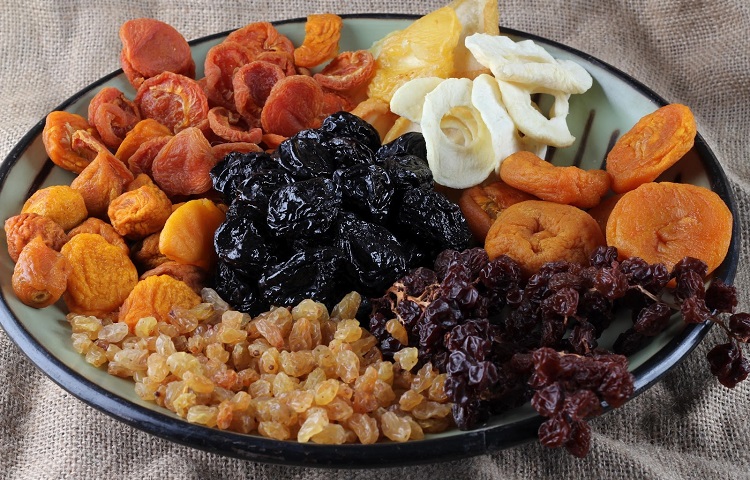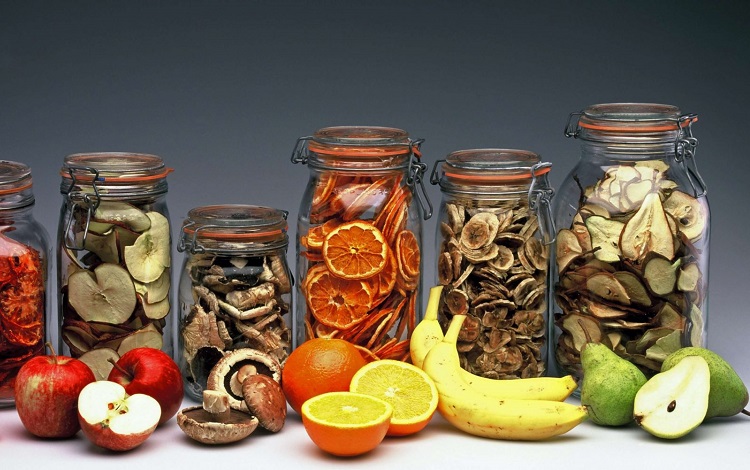Dried fruit, and the debate as to whether it is truly a healthy snack or no better than your average bag of candy, has been going on for some time.
There are many conflicting opinions on the topic, making it a fairly popular discussion that continues to this day.
Let’s discuss the ins and outs of dried fruit including what it is, how it is typically made, and the most relevant pros and cons of making, storing and consuming dried fruit as a source of nutrition.
What Is Dehydrated Fruit?

Dried fruit is fruit that has had all or almost all of its water content removed through various methods of drying.
The end product is a shrunken down, energy-dense piece of dried fruit that can be stored and enjoyed!
Dried fruit can be preserved (won’t go rotten), for a significantly longer period of time than fresh fruit. It is particularly handy as a snack and can be brought along on trips and expeditions where refrigeration is not available.
The most commonly dehydrated fruits are raisins, dates, prunes, figs and apricots. They have been a staple in Mediterranean diets for decades, and continue to grow in popularity around the world.
These dried fruits will retain most, if not all of the nutritional value of fresh fruits, depending on the method used for dehydration.
Dehydrated Fruit Pros
When it comes to dehydrated fruits there are a variety of significant benefits they can provide for aspects of health, diet, convenience and reducing food waste! Let’s discuss the main characteristics that make dried fruit a beneficial part of any diet.
Increase Nutrient Intake
The dehydration process involved in making dried fruits will naturally condense the nutrients into a compact, nutrient rich food.
Eating dried fruits can in many cases provide the body with more essential nutrients than fresh fruit. Nutrients like potassium, folate and magnesium are abundant in dried fruits and contribute significantly to overall health!
Prevents and Controls Diabetes
Despite the high sugar content in most dried fruits, they can help to prevent and reduce the risk of diabetes. Certain fruits such as dates, apricots, raisins and sultanas have a lower glycemic index than white bread.
Diabetics typically follow a diet that is based heavily on the glycemic index (GI), which aims to regulate foods that are high in glucose and will cause unwanted blood sugar spikes.
Diabetics can enjoy dehydrated fruits with peace of mind, knowing that they will not cause these blood sugar spikes, especially in comparison to starchy foods.
Commonly eaten dried fruits like raisins contain antioxidants, which have been proven to improve insulin response in the human body, as well as prevent oxidative stress and inflammation in the pancreas.
Immune System Boost

There are a number of dried fruits that can contribute to an immune system boost. Goji berries are one great example, as this superfood contains iron and a variety of vitamins.
These nutrients not only help strengthen your immune system to fight off illness, but they also will improve skin quality, among a variety of other benefits.
Improves Digestive Health
Digestive health is incredibly important for achieving an optimal level of overall health. Dehydrated fruits such as dates, figs, prunes, apricots and raisins are a great source of dietary fiber that will help with digestion and healthy bowel movements.
Prunes in particular are a great source of both soluble and insoluble fiber. Insoluble fiber is known to contribute to maintaining regular and healthy bowel movements, while soluble fiber will help moderate digestion and increase nutrient absorption from food.
Incorporating one or two servings of dried prunes in your diet will help maintain overall gastrointestinal health.
Reduce Food Waste

One of the biggest issues that seems to constantly plague our world is the lack of food supplies in many areas, and the resulting famines that continue to occur.
Food waste is happening all over the world, especially in developed countries who tend to have a surplus of food. It is incredibly important that we do our best to minimize the amount of food that is wasted in any way possible, while continuing to put forth efforts to help underprivileged communities receive the food they need to live.
Fruit is often one of the biggest contributors to food waste, as fresh fruit often does not last very long before it goes rotten and can no longer be safely consumed. Dehydrating fruit effectively prolongs its shelf life by a significant amount.
Dried fruit has been proven to last from 4 to 12 months when it is properly stored. In comparison to the one or two weeks you typically have to consume fresh fruit before it goes rotten, this is a lot more manageable and will significantly decrease the amount of food waste that happens with fruits alone.
Be sure to monitor the temperature and relative moisture content of the environment in which you are storing your dried fruit. Higher temperatures and excessive moisture can potentially cause the dried fruit to gather mold and become inedible.
Convenience
Dehydrated fruit provides an aspect of convenience that fresh fruit simply does not. These dried fruits can be packed as snacks for long term trips without worrying about rotting causing waste and unwanted odors.
On top of the fact that they will last extended periods of time when properly stored, dehydrated fruit does not require any refrigeration, and as a result no electricity or power of any sort is needed to store your fruity snacks.
Dehydrated fruits are incredibly convenient for hiking and camping, as well as for a variety of survival situations in which refrigeration is not available, and storage space for food needs to be limited to make room for essential gear etc..
Dehydrated Fruit Cons
Sugar Content & Added Ingredients

Dehydrated fruit has all of its natural water content removed. This in turn causes the sugar to concentrate into a much smaller “package”.
As a result, it is easy for people consuming dried fruit to take in too much sugar, which can be dangerous for diabetics and potentially cause hyperglycemia which can lead to a number of issues in the body.
Dried fruits, depending on how they are processed and produced, will often have additives that are potentially harmful. Sulfur dioxide is the most commonly found added ingredient in dried fruit, as it is a preservative that makes its way into a number of foods that we eat.
Sulfur dioxide is classified as a sulfite, which are known to have the potential to cause health effects if the consumer is sensitive to it. It is important to be aware of any sulfite allergies, as well as educate yourself as to which illnesses can be exasperated by sulfites in the body.
Tooth Decay
Dehydrated fruits are inherently very sticky foods when eaten thanks to the removal of their water content and concentration of sugar molecules.
These fruits will get stuck in the cracks and crevices of teeth. If these leftover pieces are not removed by flossing or bushing, they can cause substantial dental damage.
Tooth decay is one of the main concerns involved with eating dehydrated fruits. Due to the high sugar content, allowing pieces to sit unattended in the teeth can lead to tooth decay and enamel erosion over time, not to mention a breeding ground for cavities!
Individuals who have braces or any other type of dental hardware should be extra careful eating dried fruit, as they run the risk of damaging or disabling it.
High In Calories & Carbs
As previously discussed, dehydrated fruits are known to be high in sugar content, which directly translates into high carbohydrate and calorie counts.
For people on strict diets that need to be constantly aware of their calorie and carb counts, consuming dried fruit can unknowingly put them well over their limit.
Dried fruit is an easy and super accessible snack to have around, and as a result it is very easy to get carried away and over consume.
Verdict

After considering both the pros and cons of dehydrated fruit, we can provide final insight as to the benefits in relation to the potential downsides.
Dried fruit offers an awesome way to reduce food waste by extending the short shelf life of fresh fruit, which will also naturally save people money on their food bills.
Dehydrating fruit is also an incredibly effective way of bringing energy packed snacks on hiking and camping trips alike, without needing access to refrigeration. Survivalists can incorporate dried fruit into their preparation strategies in a number of ways.
On the other hand, dried fruit does pose a few issues including the addition of unwanted ingredients, the potential for dental health problems as well as dietary issues that can arise.
However, with proper due diligence and awareness, consumers can avoid these problems and reap the benefits of dehydrated fruit without the risk.
Conclusion
Dehydrated fruit is incredibly versatile and offers a number of great potential dietary and logistical benefits.
Despite some of the potential issues, taking the proper steps to find the right products and consume within the limits of your body can make dried fruit a healthy choice for anyone.
References


[lasso rel="emergency-preparedness-more-a-manual-on-food-storage-and-survival-2nd-edition-revised-and-updated" id="35334"]